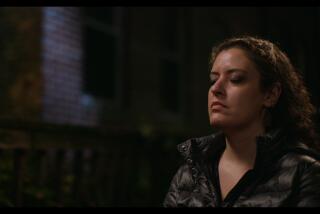Movie Reviews : ‘Lost Angels’ Falls Into Melodramatic Abyss
- Share via
You’ve seen the soothing ads on television: If your teen-ager has a drug or a drinking problem, this shady-acred estate with its licensed staff is just the place to have your troubles taken off your hands. The backdrop for the overheated “Lost Angels” (citywide) is one of these private psychiatric facilities that specialize in treating affluent kids who have taken a bad turn.
As he begins his story of Valley boy Tim Doolan (Beastie Boy Adam Horovitz), who has good reason to feel unwanted since his parents’ divorce, director Hugh Hudson walks a tightrope between a fascinating demonstration of the inner workings of such places, and the increasing melodrama of Michael Weller’s screenplay.
By the film’s end, the tightrope is gone, Hudson--and we--are wallowing in fevered, nightmarish stagings, camera movements from hell and a loss of all common sense. It’s in moments like this that you remember that Hudson is not only the director of “Chariots of Fire,” but he was also the director of “Revolution,” and it’s that movie’s jaw-dropping silliness that he is up to here.
It’s a pity, because both Horovitz, in a nicely played debut performance, and, especially, Donald Sutherland, as Tim’s white-bearded, compassionate psychiatrist, are fine.
Tim has been put in the insurance-funded facility, where Sutherland’s Dr. Charles Loftis works, primarily because Tim’s newly remarried mother doesn’t want his wild behavior to complicate her life. But Loftis is not without complications himself. His wife seems tired of heading a family that plays second fiddle to any one of his cases, and Loftis’ escape for some years has been alcohol.
Although the conclusion is the purest nonsense, the growing scenes of trust between Tim and Loftis are nicely drawn, as are many of the school sequences. But it’s never a good sign when a writer resorts to first-person narration to tell us feelings and reactions that would be better left unsaid, or performed. Then with the subplot about Tim’s influential, older stepbrother Andy (Don Bloomfield) and the gang both boys belong to--the DABs, white Valley kids who hate but emulate black and Chicano gangs--Hudson begins to hyperventilate cinematically. He is helped, unfortunately, by the excesses of the usually poetic cinematographer Juan Ruiz-Anchia.
Comfortably well-off but neglected kids have been the fodder for films from the hypnotic (“On the Edge” and “Suburbia”), to the vacuous (“Less Than Zero”). It’s not hard to see why: These casts absorb dozens of the seemingly endless supply of shiny-faced teen-age actors who flood both coasts, and the roles have sure-fire empathy with their peers who buy the tickets. (This one, however, is MPAA rated R for language and sex.)
Unfortunately, these lost angels are an uneven assortment. As Cheryl, the pivotal mixed-up siren, 17-year-old Amy Locane, who comes from television, seems to have been taught that every word needs a change of expression. Every single word. It makes her time on screen exhausting.
Almost worse is Bloomfield as Tim’s loco brother, who seems to have patterned his performance after Willem Dafoe’s in “Streets of Fire.” It’s too bad that these and other excesses of style whittle away at the affection audiences would otherwise have for these tormented kids.
More to Read
Only good movies
Get the Indie Focus newsletter, Mark Olsen's weekly guide to the world of cinema.
You may occasionally receive promotional content from the Los Angeles Times.










